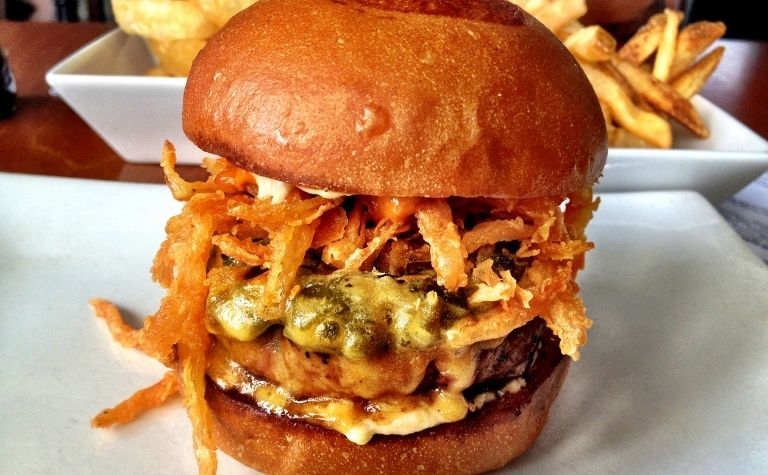The Bible teaches that self-control is a fruit of the Holy Spirit (Gal. 5:23), which means that it’s a characteristic that Christians should demonstrate and develop. All people, including Christians, eat and drink multiple times per day. Some people struggle with self-control when it comes to eating. But is overeating a sin?
Overeating is a sin because it’s the result of a lack of self-control and an expression of self-indulgence. Overeating is associated with worldliness and laziness in the Bible. Scripture includes clear and strong warnings about unholy, self-indulgence when eating. Food can even become an idol.
How can food be an idol? Exactly how much eating is overeating? Why do people overeat? Why is it so hard to stop overeating? Why is overeating associated with laziness in the Bible? Keep reading to learn the answers to these questions and others.
Also see Does the Bible Say Smoking Marijuana Is Sinful? to learn more.

Food As A False God
Can food really become an idol? Yes. People who struggle with overeating, which is a form of gluttony, often testify to this. According to the Bible, idolatry isn’t just physically bowing down to a golden calf or spiritually worshipping the false god of another religion. Idolatry is when anything takes priority over God in a person’s life.
Ken Sande writes, “An idol is anything apart from God that we depend on to be happy, fulfilled, or secure. In biblical terms, it is something other than God that we set our heart on that motivates us, that masters and rules us, or that we trust, fear, or serve. In short, it is something we love and pursue more than God.” [1]
People, possessions, and even food and drink can become idols. When people obey the impulses and cravings of their body instead of God, food becomes a person’s master and is, therefore, an idol. Jesus said, “do not be anxious about your life, what you will eat or what you will drink, nor about your body, what you will put on. Is not life more than food, and the body more than clothing?” (Matt. 6:25)
In the book of Philippians, Paul describes a group of people that essentially worshiped food. He described them in this way: “Their end is destruction, their god is their belly, and they glory in their shame, with minds set on earthly things” (Phil. 3:19; ESV).
The NIV says their god is their “stomach.” The NLT says their god is their “appetite.” The gluttony of the people Paul is referring to is an expression of unholy, worldly self-indulgence.
Exactly how much eating is overeating? The quantity of food that amounts to “overeating” is different for every person. In general, doctors say that men need to eat more calories than women and that adults need more calories than children. Growing teenagers may need more calories than anyone.
People need to use wisdom to discern what “overeating” is for them. Asking a doctor for advice is a great first step. Important questions to consider include:
- Your gender
- Your age
- Your height
- The presence of underlying medical conditions (e.g. diabetes, high blood pressure, medications)
- The quantity and quality of the food you’re eating: high-calorie, low-nutrition “junk food” vs fruits and vegetables
- Consult your doctor for more considerations
Are there certain excesses everyone should avoid? Yes. Even though “overeating” is relative in some ways to gender, age, and body type, there are excesses that are unhealthy for anyone.
- In his book Respectable Sins author Jerry Bridges writes about a man who drank 12 cans of diet soda each day. The author of this article knows of a pastor who had a similar habit, which he only successfully broke after he retired. There are numerous people with soda addictions who are consuming unhealthy amounts of caffeine and sugar or aspartame. [2]
- This author recalls hearing about a family friend who spent days in the hospital because of a coffee (i.e. caffeine) addiction. His daily routine grew to include four pots of coffee each day. His alertness level developed a tolerance for the caffeine, but his heart didn’t. The quantity of caffeine in his body led to irregularities in his heart and the problems required a hospital stay to stabilize them.
While complete abstinence from addictive food and drinks may be the solution for some, the general biblical principle is that people exercise self-control. Proverbs 25:28 reads, “A man without self-control is like a city broken into and left without walls.”
Why do people overeat? People over-indulge in food and drink for a variety of reasons. Some people enjoy the taste of certain foods because it makes them feel good and they can’t easily break away from the pleasure it brings them. Other people eat for psychological and emotional reasons such as feeling depressed, anxious, stressed out, or worried. The reasons why people overeat are countless.
Also see Does the Bible Say Getting Drunk Is Sinful? to learn more.
Why is it so hard to stop overeating? There are a variety of answers to this question. Some foods have addictive properties, which the body grows to crave like sugar and caffeine. Another reason is that large portions have become the norm in some households, cafeterias, and restaurants. Over time, what’s considered “normal” changes for certain sizes and quantities. For example, a medium soda used to be 8 ounces; now it’s 32 in some places.
Sin is hard to overcome, whether it relates to eating and drinking or not. However, overcoming sin is possible through the power of the Holy Spirit and the Word of God because of Christ’s death over sin at the cross. Psalm 119:11 reads, “I have stored up your word in my heart, that I might not sin against you.”

Overeating is associated with laziness in the Bible
Laziness and overeating often go together in the Bible. They are negative influences that encourage each other. Yet it’s also often the case that when a person overcomes laziness, it helps them not overeat.
Why is overeating associated with laziness in the Bible? When people overeat, they fail to demonstrate self-control and lack self-discipline. Being a disciple of Christ implies a certain amount of discipline — notice that those two words share the same prefix — disc, which means “to cultivate.” Discipline in the Christian life doesn’t take the form of legalism, which is sinful, but of self-control.
The prophet Amos noted that those who were spiritually deficient in Israel in his day prioritized resting and eating to their own demise. “Woe to those who lie on beds of ivory and stretch themselves out on their couches, and eat lambs from the flock and calves from the midst of the stall… Therefore they shall now be the first of those who go into exile” (6:4-7).
Additionally, Proverbs 23:21 reads, “For the drunkard and the glutton will come to poverty, and slumber will clothe them with rags” (ESV).
Overeating may lead to other sins
Jerry Bridges writes, “Another reason we must closely govern our indulgence of food and drink is that the person who overindulges his body at this point will find it more and more difficult to mortify other sinful deeds of the body. The habit of always giving in to the desire for food and drink will extend to other areas. If we cannot say no to an indulgent appetite, we will be hard-pressed to say no to lustful thoughts.” [3]
Also see Does the Bible Say Kissing Is Sinful? to learn more.
7 Bible verses about overeating
- 1 Corinthians 10:31, “So, whether you eat or drink, or whatever you do, do all to the glory of God.”
- Proverbs 23:2, “And put a knife to your throat if you are given to appetite.”
- 1 Corinthians 6:19-20, “Or do you not know that your body is a temple of the Holy Spirit within you, whom you have from God? You are not your own, for you were bought with a price. So glorify God in your body.”
- Proverbs 23:20-21, “Be not among drunkards or among gluttonous eaters of meat, for the drunkard and the glutton will come to poverty, and slumber will clothe them with rags.”
- Philippians 3:19, “Their end is destruction, their god is their belly, and they glory in their shame, with minds set on earthly things.”
- Proverbs 25:27, “It is not good to eat much honey, nor is it glorious to seek one’s own glory.”
- 1 Corinthians 3:16, “Do you not know that you are God’s temple and that God’s Spirit dwells in you?”
7 Bible verses about self-control
- Titus 1:8, “But hospitable, a lover of good, self-controlled, upright, holy, and disciplined.”
- 2 Timothy 1:7, “For God gave us a spirit not of fear but of power and love and self-control.”
- 1 Peter 4:7, “The end of all things is at hand; therefore be self-controlled and sober-minded for the sake of your prayers.”
- Galatians 5:22-23, “But the fruit of the Spirit is love, joy, peace, patience, kindness, goodness, faithfulness, gentleness, self-control; against such things there is no law.”
- Proverbs 16:32, “Whoever is slow to anger is better than the mighty, and he who rules his spirit than he who takes a city.”
- 2 Peter 1:5-6, “For this very reason, make every effort to supplement your faith with virtue, and virtue with knowledge, and knowledge with self-control, and self-control with steadfastness, and steadfastness with godliness.”
- Titus 2:6, “Likewise, urge the younger men to be self-controlled.”
Also see Is Gossip A Sin? to learn more.
References:
[1] The Peacemaker by Ken Sande. p. 104.
[2] Respectable Sins by Jerry Bridges. p. 111.
[3] The Pursuit of Holiness by Jerry Bridges. p. 109-110.
Related Articles
1 John 5:16 makes a distinction between a sin that leads to death and a sin that doesn't. This description confuses some readers and troubles others. That there is a "sin that leads to death" raises...
Sloth has always been an especially notorious sin in the Christian church because it's a behavior (or lack thereof) that is highlighted in the Bible as ungodly. Sloth is even one of the Seven Deadly...
